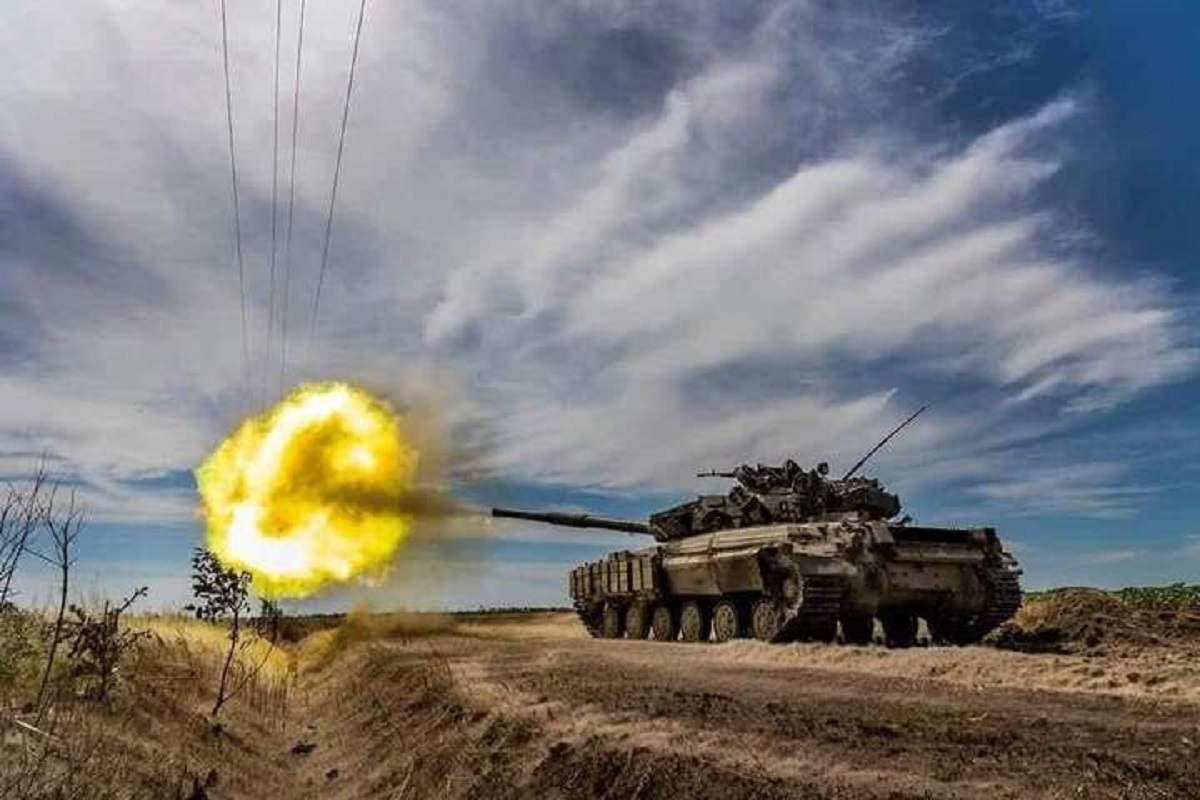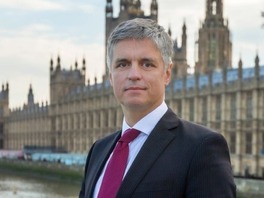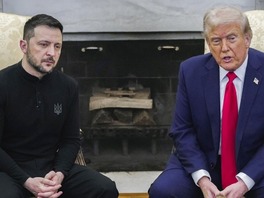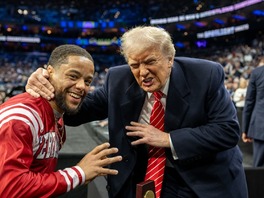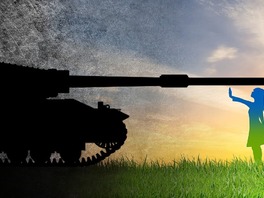In 2023, Ukraine grappled with a pivotal issue: the sustained backing from the United States, both financially and militarily. The discourse surrounding this matter became a focal point in the ongoing political tussle between Democrats and Republicans. As the U.S. presidential elections loom in the autumn of 2024, the odds favoring Republican contender Donald Trump raise the specter of potential uncertainty for Ukraine in the coming year. Despite this, Ukraine remains steadfast in its pursuit of European integration, and the Kremlin's attempts to shift the spotlight away from Ukraine using the Gaza Strip conflict have proven unsuccessful. What else in terms of foreign policy will be remembered in 2023, read in the article of Apostrophe.
American Aid Hangs by a Thread
Late 2023 witnessed a critical development: the ongoing Western financial support for Ukraine in the midst of conflict. President Joe Biden proposed a substantial $106 billion military aid package to Congress, allocating $61 billion for Ukraine, Israel, and the Indo-Pacific nations, notably Taiwan. Yet, newly elected Republican Speaker of the House, Mike Johnson, advocates treating military aid for Ukraine and Israel as distinct matters.
Tensions over sustaining aid to Ukraine escalate in Washington. On December 6, the Senate faced a procedural hurdle as the aid funding bill failed to pass, with Republicans insisting on bolstering migration policies at the southern U.S. border. President Biden urges swift approval, emphasizing the need to back Ukraine to avert the deployment of American troops in Ukraine during its war with Russia.
U.S. Secretary of State Anthony Blinken underscores the crucial significance of providing aid to Ukraine, stating that failure to secure Congressional approval for the aid package by year-end would only gratify Moscow, Tehran, and Beijing.
President Zelensky visited Washington on December 12, engaging with Biden and senators on the Ukrainian matter. Despite his endeavors, the fate of the aid package remains uncertain. In response to the Congressional deadlock, Biden issued a stern remark, asserting that the U.S. will assist Ukraine ‘as much as it can,’ a departure from the previous commitment to help "as much as needed."
The demand for over $110 billion in aid to Ukraine sparks political deliberations in both Washington and Brussels. Western apprehensions revolve around Kyiv's ability to endure a Russian military onslaught and safeguard urban areas, infrastructure, and harbors from missile attacks. In anticipation of a potential shortage of air defense weaponry in Ukraine, the Kremlin escalated missile and drone attacks on Ukrainian cities by the end of October.
The U.S. deliberations carry weighty consequences for Ukraine, prompting European assessments of potential repercussions for NATO if American support for Kyiv falters. European leaders must reassess Kremlin threats to Eastern flank nations within the Alliance.
As 2023 concluded, European analysts grew more assertive, contending that a Ukrainian defeat would embolden Moscow to extend its influence, potentially aiming to roll back NATO to its 1997 borders, as previously advocated by Kremlin diplomats prior to the overt invasion of Ukraine.
‘Withdrawing support from Ukraine poses risks for the entire NATO, including the U.S., despite their distant geographical positioning. Financial contributions from the U.S. may not reach $60 billion but could hover around $40-50 billion, potentially with increased reporting obligations. The White House stance emphasizes funding for Ukraine as a strategic move, asserting that a significant portion will circulate back into the U.S. military-industrial complex. Supporting the Ukrainian Armed Forces is framed as an investment in U.S. security, aiming to obviate the need for the Pentagon to deploy troops to Europe in defense of NATO allies in case of contingencies,’ military expert Ivan Stupac tells Apostrophe.
Ukraine's Defeat Threatens Everyone
Amidst U.S. uncertainty, the Western media has witnessed a surge in pessimistic articles, delving into the potential consequences if Moscow, reclaiming the battlefield initiative, expands its territorial gains in Ukraine. Perturbing questions from Western analysts ponder the scenario: "What if Putin wins?".
In summary, the outlook is grim. Western authorities worry that, sans U.S. assistance and backing from other Western nations, Ukraine's ability to sustain independent military operations is limited.
Per CNN, drawing from statements by numerous U.S. and European officials, Western intelligence agencies are gauging Ukraine's resilience without external aid. A U.S. military source indicates a span of several months, raising concerns of a potential significant setback or even defeat by the summer of 2024.
‘Success is not assured with our involvement, but their failure is certain without us,’ a senior US military official told reporters.
A key worry in the West is the potential ramifications of dwindling support on Ukrainian counteroffensives in the eastern and southern regions. Troops face challenges in achieving substantial progress there amid ongoing U.S. military aid.
According to Western officials, if American aid ceases, Ukraine would exhaust its reserves of long-range missiles, followed by air defense systems, artillery shells, and shorter-range missiles, including Javelin anti-tank missiles and Stinger anti-aircraft missiles.
The absence of a decision from the US Congress on military assistance is already impacting the military situation in Ukraine. Reports indicate that Ukrainian troops are compelled to ration ammunition, while Russian forces enjoy a five to sevenfold advantage in this aspect.
As per a Ukrainian military spokesperson interviewed by CNN, the diminished firepower of Ukrainian troops has resulted in an increase in number of casualties among military personnel.
The impasse on U.S. and European aid sparks deliberations among Ukraine backers on an unforeseen outcome: the potential for Russian President Vladimir Putin to achieve success through alternative means.
American and European officials grasp that such an outcome is poised to carry global repercussions. It could cast doubt on the unwavering nature of U.S. defense commitments to its global partners and allies, potentially leading to political turmoil surpassing the magnitude of the somber U.S. troop withdrawal from Afghanistan, further compounded by the prospect of a Trump victory.
In this scenario, friction in Washington's ties with NATO allies is unavoidable. The potential return of President Trump may revive talk of a "good deal" with Putin, possibly at Ukraine's expense. There's a risk of U.S. withdrawal from international structures, including NATO, as Trump deems it unnecessary for Americans to "overpay" for European security.
By year-end, authorities in Colorado and Maine barred Trump from the presidential race, citing his alleged involvement in the Capitol insurrection. However, the ultimate verdict rests with the U.S. Supreme Court, and its ruling will be applicable nationwide.
Recent reporting from Politico suggests that the Biden administration is purportedly adjusting its strategy, potentially shifting the focus from militarily defeating Russia to bolstering Kyiv's position for potential negotiations with Moscow. Terms like "negotiations," "freeze," and "truce" have gained alarming prominence in Western media since the final days of the previous year.
‘Advocates of "negotiation" and "freeze" plans face a critical question: how to compel Putin to engage in talks? The Kremlin's strategy involves waiting for U.S. and EU elections to dictate terms later. Any current "freeze" signifies Putin losing a significant part of Ukraine, maintaining its statehood and identity. These notions amount to self-soothing, wishful thinking and a denial of reality. The harsh truth is that Putin is waging an existential war to resurrect the "empire," and only a forceful intervention can halt his intentions. He doesn’t intend to come to an agreement, he can only be stopped,’ political expert Petro Oleschuk tells Apostrophe.
European Prospects and NATO
In 2023, Ukraine's primary foreign policy achievement was attaining the status of a candidate for the European Union.
In October, the European Commission advised the European Council to initiate accession talks with Ukraine. On December 14, a historic decision was made to commence formal negotiations. Starting in spring 2024, Ukraine must undertake four crucial reforms, encompassing anti-corruption measures, curbing oligarch influence on legislation, and safeguarding the rights of national minorities. These prerequisites are essential for approving the ‘negotiating framework’ for EU accession.
In November, European Council President Charles Michel, visiting Kiev, suggested Ukraine might be prepared to join the EU by 2030. However, uncertainties persist due to the ongoing military conflict, as highlighted by Michel.
On the global stage, the Vilnius NATO summit in July 2023 held significance. While the summit fell short of Kyiv's expectations, the crucial takeaway was Ukraine's potential NATO membership without a prerequisite Membership Action Plan - the notorious MAP.
Secretary General Jens Stoltenberg announced that this move shifts Ukraine's NATO accession from a two-stage to a one-stage process. However, he emphasized that Kyiv shouldn't anticipate joining the Alliance during the conflict with Russia.
The Vilnius summit provided no specific timeline for Ukraine's potential NATO entry. Attention shifts to the upcoming 2024 Washington summit, where Ukraine seeks clearer prospects for Alliance membership.
‘An odd scenario emerged around the notion of Ukraine's "partial accession" to NATO, a proposal never officially presented to us. It's worth noting that individuals unrelated to the Alliance's decision-making process raised these ideas. If a viable plan existed, why wasn't it implemented between 2014-2022, when only Crimea and ORDLO were occupied? The persistent threat from Russia's nuclear capabilities was the deterrent. This menace from the Russian Federation remains pertinent’, Oleschuk noted.
Conflict with Poland
In 2023, a dispute unfolded between Warsaw and Kiev during the Polish election campaign. Poland, a crucial ally for Ukraine, imposed a ban on Ukrainian grain imports, still in effect. Ukrainian experts suggest the move may stem from Poland's Prawo i Sprawiedliwość party seeking additional votes from Polish farmers in the October 15 parliamentary elections.
On September 19, tensions escalated with bold remarks from Polish President Andrzej Duda and Ukraine's Volodymyr Zelensky in New York. Duda justified the embargo extension, likening Ukraine to a drowning man endangering the rescuer. Zelensky, addressing the UN General Assembly, criticized the grain import ban, accusing certain European countries of undermining solidarity.
In early November, bilateral relations further soured as Polish carriers initiated a strike at the Ukraine border, impeding freight transport passage through three checkpoints.
The electoral loss of the ruling party in Poland, a government change, and the appointment of moderate European Donald Tusk as the Prime Minister could alleviate tensions in bilateral relations. The new government shows a willingness to engage in dialogue rather than adopting a posture, a departure from its predecessors.
‘The new government in Warsaw brings a chance for resolution, particularly amidst Russia's barbaric missile attacks on Ukrainian civilians, including an incident where a Russian missile encroached into Polish territory.
In 2024, our neighbors face the choice of the greater threat: Russian missiles or Ukrainian trucks facilitating transit from Ukraine to Europe,’ political strategist Alexey Golobutsky highlighted in a discussion with Apostrophe.
Gaza War: Is Israel in a Deadlock?
Since October 2023, a renewed conflict erupted in Israel, featuring a terrorist attack by Hamas militants and the IDF response. This has influenced American support for Ukraine, prompting a reassessment of perceptions and a shift in United States foreign policy priorities.
This scenario, as suggested by certain international experts, might result in diminished U.S. focus on the conflict in Ukraine, underscoring the challenge of managing diverse global crises and challenges.
In a recent Wall Street Journal article, Israeli Prime Minister Benjamin Netanyahu outlined three key conditions for achieving peace. He asserts the need for eliminating Hamas, cessation of hostilities in Gaza, and a shift in radical sentiment within Palestinian society.
The Times of Israel underscores that Netanyahu's article omits the significance of securing the release of numerous hostages held in Gaza.
The Prime Minister underscored the support of countries such as the US, UK, France, Germany, and others in Israel's effort to dismantle the Hamas terrorist group. He emphasized the necessity to neutralize Gaza's military capabilities and terminate its political governance for this purpose.
Benjamin Netanyahu stressed the necessity for assurances that Gaza will not serve as a launching pad for attacks on Israel. This entails establishing a temporary security zone around Gaza and implementing a border inspection mechanism with Egypt to curb arms smuggling.
In conclusion, the Israeli prime minister remarked that expecting the Palestinian Authority to demilitarize Gaza after the conflict is unrealistic.
Netanyahu condemns the Palestinian Authority for financing terrorism in Judea and Samaria, along with instilling aggressive views against Israel in Palestinian children. He advocates for educational initiatives that prioritize the value of life over death and urges imams to cease preaching that incites violence against Jews.
Transforming Palestinian society to resist rather than fund terrorism is imperative, according to Netanyahu. He contends that achieving this demands robust and ethical leadership, highlighting that Palestinian Authority President Mahmoud Abbas refrains from condemning terrorist attacks.
The IDF asserts that Hamas utilizes civilian institutions in the Gaza Strip, including refugee camps and hospitals, to conceal terrorist infrastructure. Despite international criticism over mounting civilian casualties, Israel continues military operations against Hamas. Criticism is voiced even by countries that typically support Israel's policies.
In this context, the stance of the White House and the U.S. State Department is noteworthy. They emphasize the necessity for a negotiation process, primarily to facilitate the release of hostages and, at the utmost, to avert a major escalation in the Middle East.
The Israeli leadership insists that only through the destruction of Hamas, demilitarization of Gaza, and the initiation of deradicalization in Palestinian society can Gaza be restored, paving the way for broader peace in the Middle East.
It appears that Netanyahu himself admitted that completely annihilating Hamas would require eliminating a significant portion of Palestinians, which, firstly, would be a war crime and incite unrest in the Arab world, where there are countries aligned with the U.S. Secondly, it is simply physically impossible, political scientist and international relations expert Volodymyr Volya tells to Apostrophe.
‘Similarly, the Palestinians and their sympathetic Arab states cannot eradicate Israel. This collective reality compels the United States and the entire West to advocate for negotiations. Anticipate a significant international conference in 2024 addressing the Gaza situation, outlining the specifics of deradicalization in the sector and the post-war settlement and reconstruction process,’ Volya says.
Is the Karabakh Issue Solved?
Last year, the Kremlin 'strategists' failed not only in the Middle East, but in Transcaucasia. Azerbaijan launched an operation on September 19 to reclaim Nagorno-Karabakh, targeting the illegal "Nagorno-Karabakh Republic - in fact the same as pro-Russian so-called Donetsk People Republic in Ukraine.
On September 20, Russian 'peacekeepers' facilitated a ceasefire agreement between Azerbaijan and the unrecognized republic. Nagorno-Karabakh representatives claim over 200 casualties, including 10 civilians, during the Azerbaijani operation.
Baku confirmed the demise of six Russian 'peacekeepers' in Nagorno-Karabakh. Azerbaijani President Ilham Aliyev apologized to Vladimir Putin for their deaths. The Kremlin's endorsement of a peace treaty between Armenia and Azerbaijan signaled support for Baku's sovereignty over Karabakh, intensifying the rift between Yerevan and Moscow. Armenia even threatened to exit the CSTO - agreement on collective security created by Russia rather to manipulate post-Soviet countries than to provide real military defense support.
The details of the potential peace treaty between Azerbaijan and Armenia remain uncertain, and the initiation of negotiations is uncertain. However, it is evident that Baku has effectively resolved the Karabakh separatism issue.
On September 25, Reuters noted the migration of ethnic Armenians from Nagorno-Karabakh to Armenia by car. The leadership of the self-proclaimed PRC claimed readiness for 99.9% of the region's inhabitants to leave Karabakh, but subsequent events revealed these assertions to be inaccurate.
‘In Karabakh, the Armenian community faces no forced removal, and there's no substantiated proof of terrorism or ethnic cleansing. Reports of famine in Khankendi threatening Armenians lack reliable confirmation. Nonetheless, a pervasive fear exists concerning potential repercussions for past crimes, extending even to those born in the region after the 1990s events,’ military-political analyst Olexander Kovalenko of the Information Resistance group highlighted in the comments of Apostrophe.
Since the conclusion of the 44-day war in 2020, there have been no hostile actions against the Armenian population in the liberated segment of Karabakh. On the contrary, Armenians who stayed in the area have found employment opportunities, leading lives without the specter of genocide. Alexander Kovalenko, in particular, noted that in Shusha, numerous Armenians have engaged in the construction sector, choosing to reside in the city post-war.

